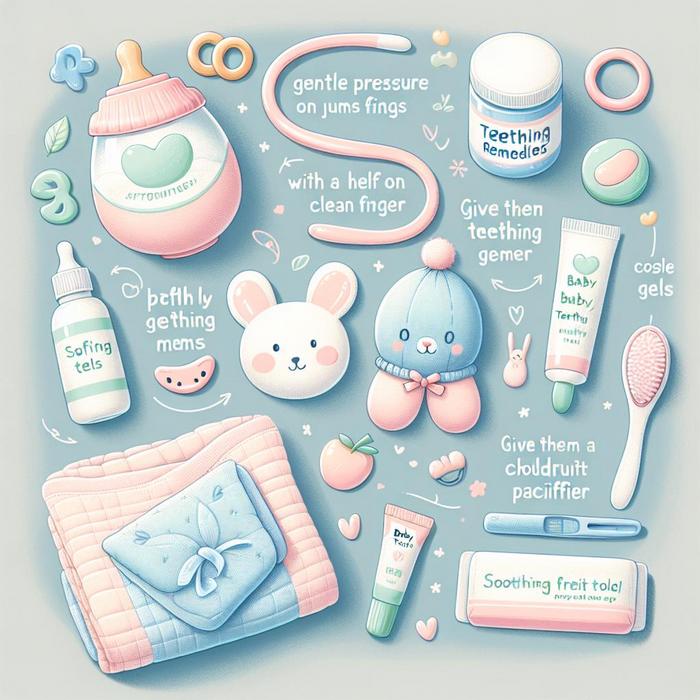Understanding Your Teething Baby’s Discomfort
One of the biggest challenges new parents face is watching their baby go through the teething process. It can be heart-wrenching to see your little one in pain and not understanding why. However, with some knowledge and the right teething remedies, you can help soothe your baby’s discomfort.
What Happens During Teething?
Teething is an important milestone in your baby’s development. This is when the first set of teeth, also known as primary teeth, start to break through the gums. According to Mayo Clinic, this process typically begins between 6 and 22 months. It’s crucial to understand that each baby is unique, and their teething timeline can vary.
Signs Your Baby Is Teething
Teething babies often display similar signs. As a parent, keeping an eye out for these indicators can help you address their discomfort promptly.
- Drooling
- Fussiness and irritability
- Difficulty sleeping
- Swollen or tender gums
- Teething rash around the mouth due to excessive drooling
If your baby is showing these signs, it’s essential to begin implementing soothing strategies to alleviate their discomfort.
Soothing Your Teething Baby: Remedies and Tips
There are various ways to soothe a teething baby. Here are some effective baby teething tips you might consider:
- Teething toys: Teething toys made from BPA-free materials can help alleviate the pressure your baby feels on their gums.
- Cold items: Chilled spoons, pacifiers, or teething rings can offer much-needed relief. However, be sure not to freeze these items, as they can become too hard and risk hurting your baby’s gums.
- Comforting touch: Gently massaging your baby’s gums with a clean finger can provide relief from teething discomfort.
- Over-the-counter remedies: If your baby is particularly uncomfortable, talk to your pediatrician about over-the-counter remedies.
In addition to these remedies, showing empathy towards your baby can also help. This can be an emotional time for both of you, and your comforting presence can make a big difference.
As attachment expert Sue Gerhardt explains, “Being a mother is not about what you gave up to have a child, but what you’ve gained from having one.” This sentiment rings true, especially when navigating the teething stage. Embracing the role of a comforting parent can be empowering and help nurture a deeper bond with your baby.
Helping Your Teething Baby
Helping your baby during this challenging phase involves identifying the discomfort and finding the appropriate strategies to provide relief. Let’s delve into some recommendations for easing your baby’s teething discomfort, so you can both have fewer stressful days and sleep-filled nights.
- Keeping Things Clean: One essential method to keep your teething baby’s discomfort to a minimum is maintaining oral hygiene. Regularly cleaning your baby’s mouth will help ensure that gum irritation and swelling are reduced.
- Foods to Chew On: If your baby has started on solids, giving them a piece of cold cucumber or carrot can be soothing. However, supervise them to avoid potential choking. Please refer to this enlightening NHS article to learn more about safe food items during this period.
- Pain Relief Medication: If your baby’s discomfort is extreme, you may consider administering a child-safe pain reliever. Be sure to consult your pediatrician before giving your baby any medication.
The Do’s and Don’ts When Your Baby Is Teething
While the teething phase is natural, it’s crucial to know what to embrace and what to avoid. The FDA provides some valuable safety guidelines for this period.
- DO: Consult your healthcare provider if the baby has a fever or diarrhea. These are not typical teething symptoms and could indicate a more serious issue.
- DO NOT: Use teething jewelry like necklaces, bracelets, or anklets. They pose choking and strangulation hazards.
- DO: Provide a safe environment for your baby to chew on. This includes giving them safe toys and foods.
- DO NOT: Use over-the-counter teething products containing benzocaine or lidocaine, as they can be harmful.
The Importance of Empathy
Remember, as challenging as teething can be for you, it’s more stressful for your baby. As Pampers suggests, keeping a soothing and patient attitude is one of the greatest reliefs you can offer your child during this trying period. As well as helping your baby physically, maintain a serene environment to help keep your baby’s stress levels down.
Dealing with Teething at Night
Nighttimes can be particularly troublesome when dealing with a teething baby. They may wake up frequently due to discomfort. So, how do you soothe a teething baby at night? The pain can be resolved using some of the mentioned tips, but you can also maintain a calm and cozy environment, maintain regular sleeping patterns, and ensure your baby’s head is elevated to reduce gum inflammation. For more strategies on how to ease a teething baby at night, check out this article on Healthline.
Consult a Pediatric Dentist
If you’re worried about your baby’s teething process or if teething appears to be causing severe discomfort, don’t hesitate to seek advice from a pediatric dentist. They are specialists in handling children’s dental health and can offer further professional advice, as well as ensuring your baby’s teeth are growing in properly.
Ultimately, while the teething period can be a challenge for both you and your baby, know that it won’t last forever. The tears and sleepless nights will pass, and before you know it, your baby will have a beautiful set of baby teeth.






